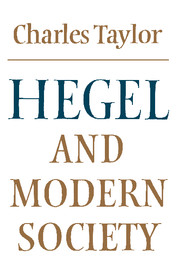3 - The issue of freedom
Published online by Cambridge University Press: 05 June 2012
Summary
THE END OF HEGELIANISM
In the last sections I have been trying to illustrate the dual claim that while Hegel's ontology is near incredible his philosophy is very relevant to our age. I have tried to show this by examining Hegel's political philosophy in relation to some of today's basic issues.
Now in this third chapter I should like to examine a little more closely how this came about. What developments of modern civilization have tended to make Hegel's synthesis implausible? And how at the same time have the questions he asked and the way he asked them remained relevant? In trying to answer these questions we shall be looking at some of the transformations undergone by the central aspiration of Hegel's time, to combine radical autonomy and expressive fulfilment. And this will naturally lead us to a major issue about the nature of freedom.
Now the first question – why is Hegel's synthesis implausible today? – may seem easy to answer. We might think that the development of the modern industrial, technological, rationalized society which we referred to in 2.1, entrenching as it did the Enlightenment definition of man, has put paid to any and all expressivist visions of man in communion with nature, and nature as expression of Spirit, which the Romantic era spawned. Hegel's vision, albeit more rational in form and penetrating in insight, has gone under with the rest.
- Type
- Chapter
- Information
- Hegel and Modern Society , pp. 135 - 169Publisher: Cambridge University PressPrint publication year: 1979

